One Blue Eye, Two Servings
“One Blue Eye, Two Servings” was a series of paintings exhibited at CRUSH Curatorial in 2018 with Nicole Won Hee Maloof.
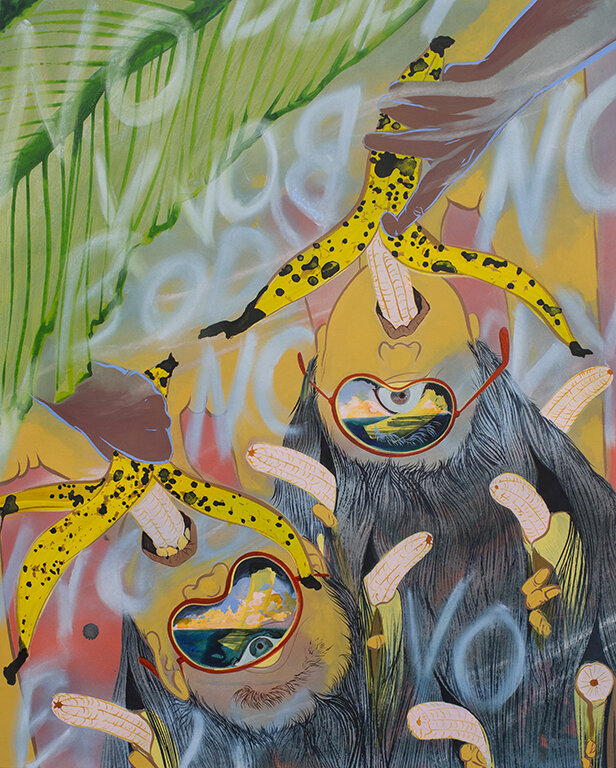
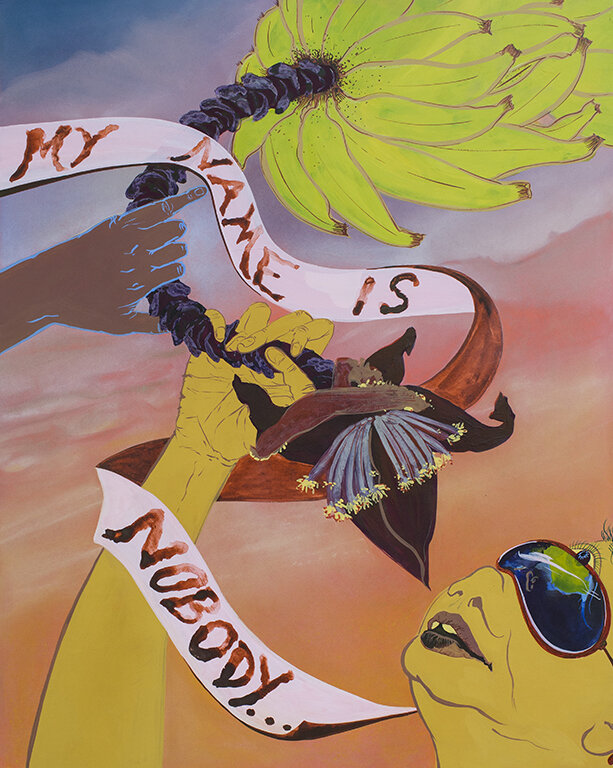
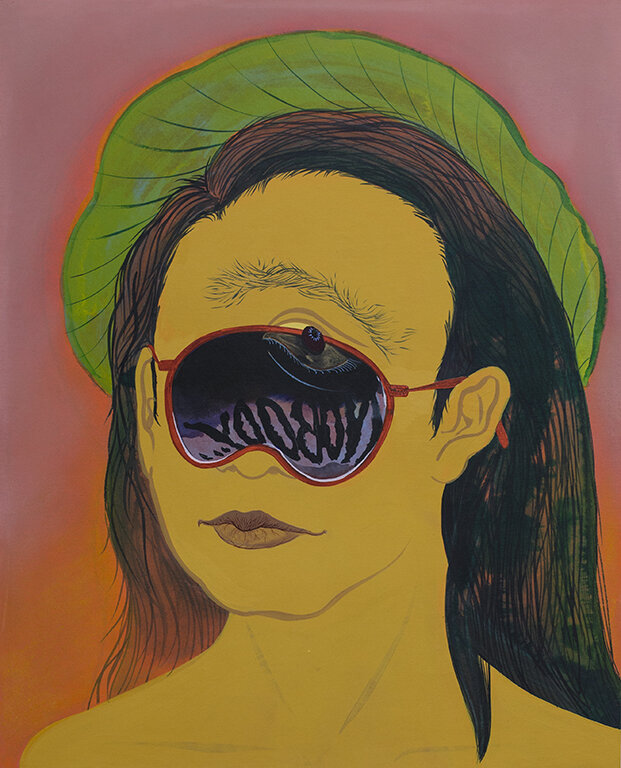
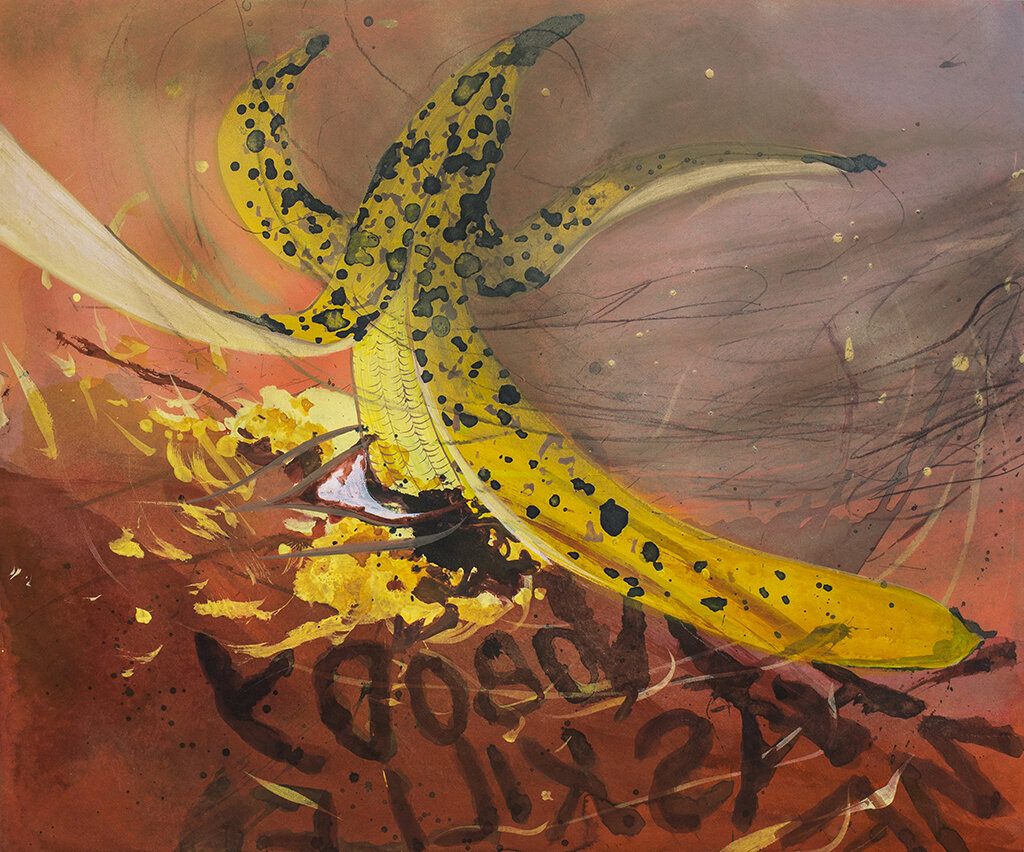
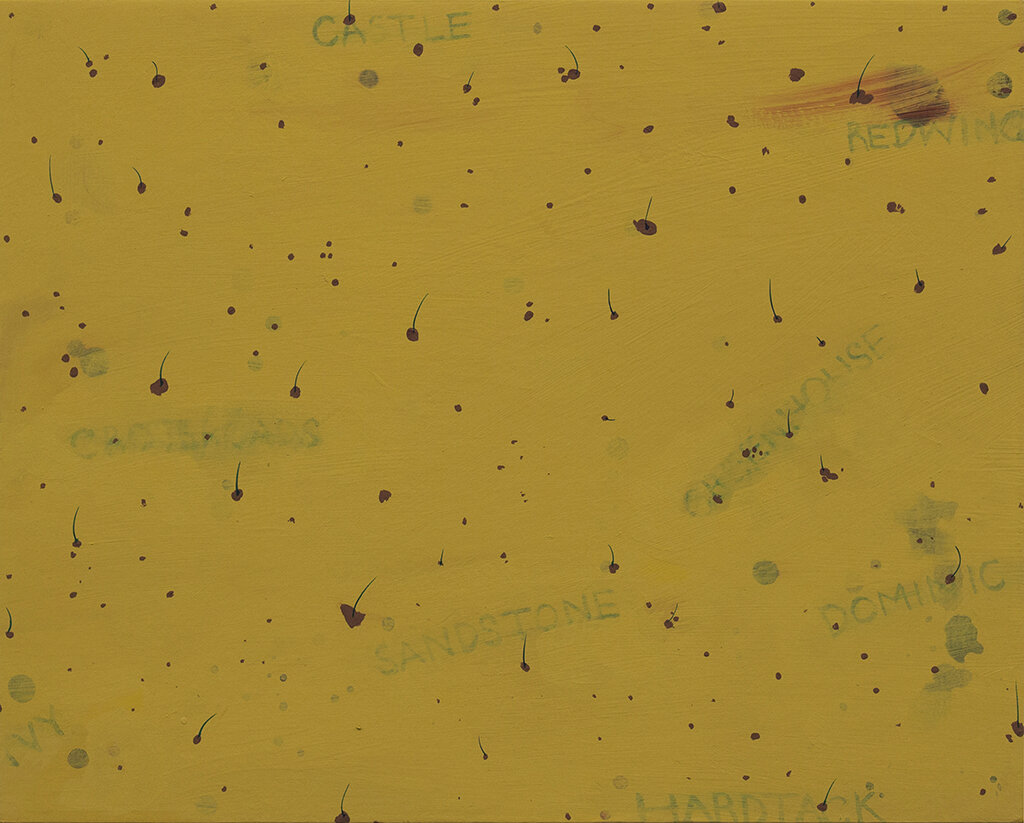
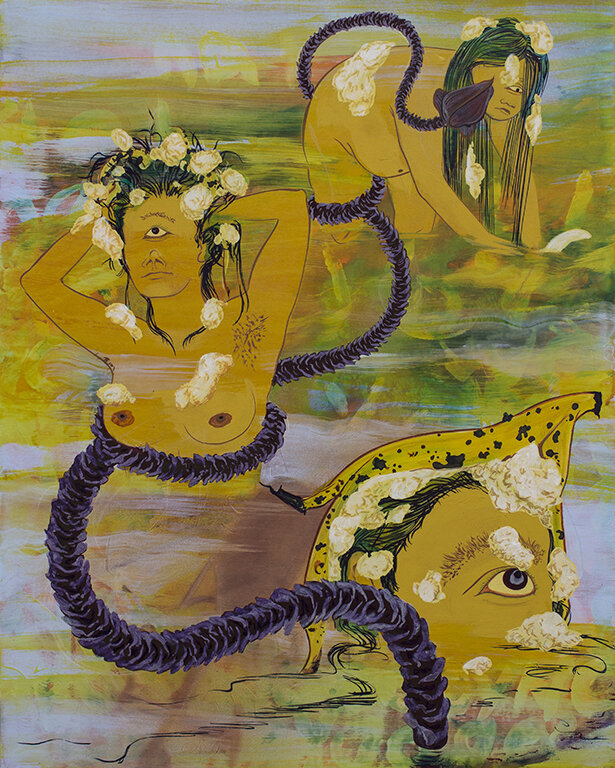
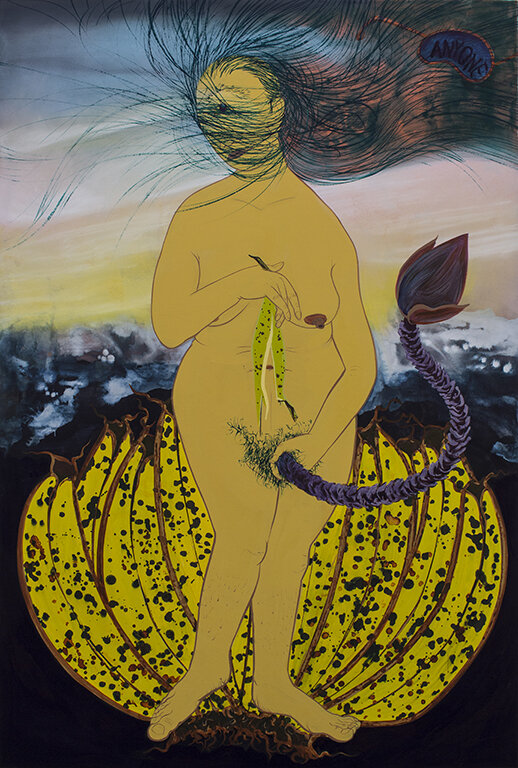
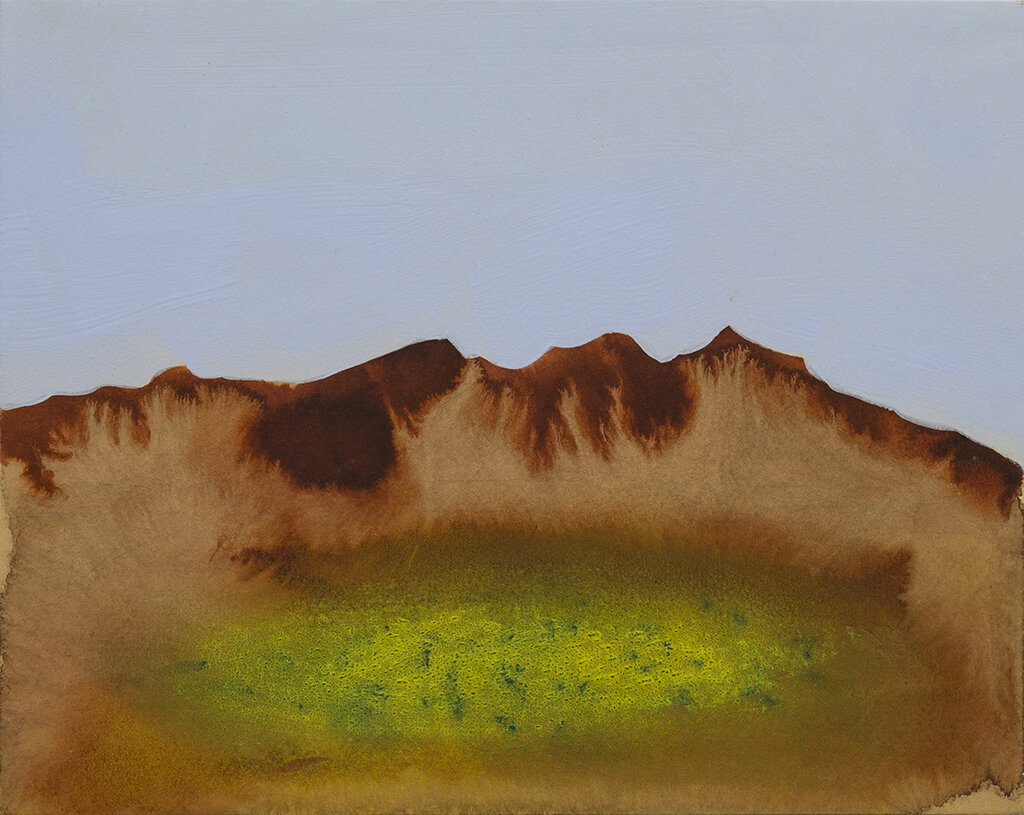
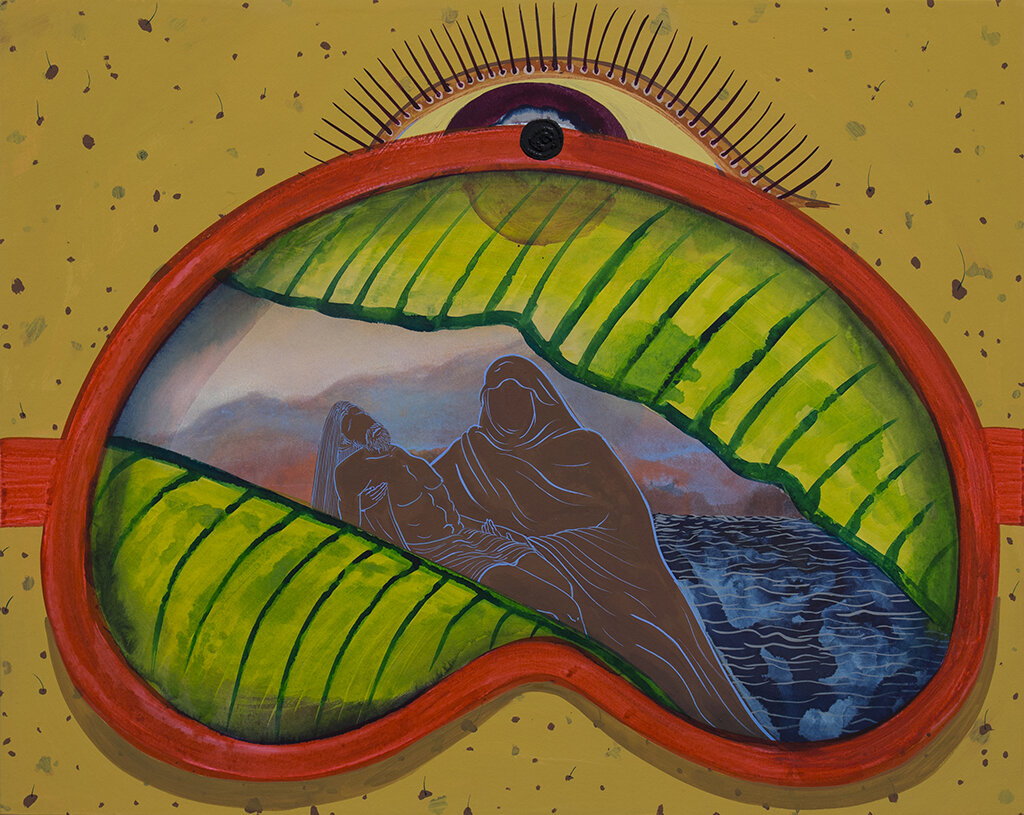
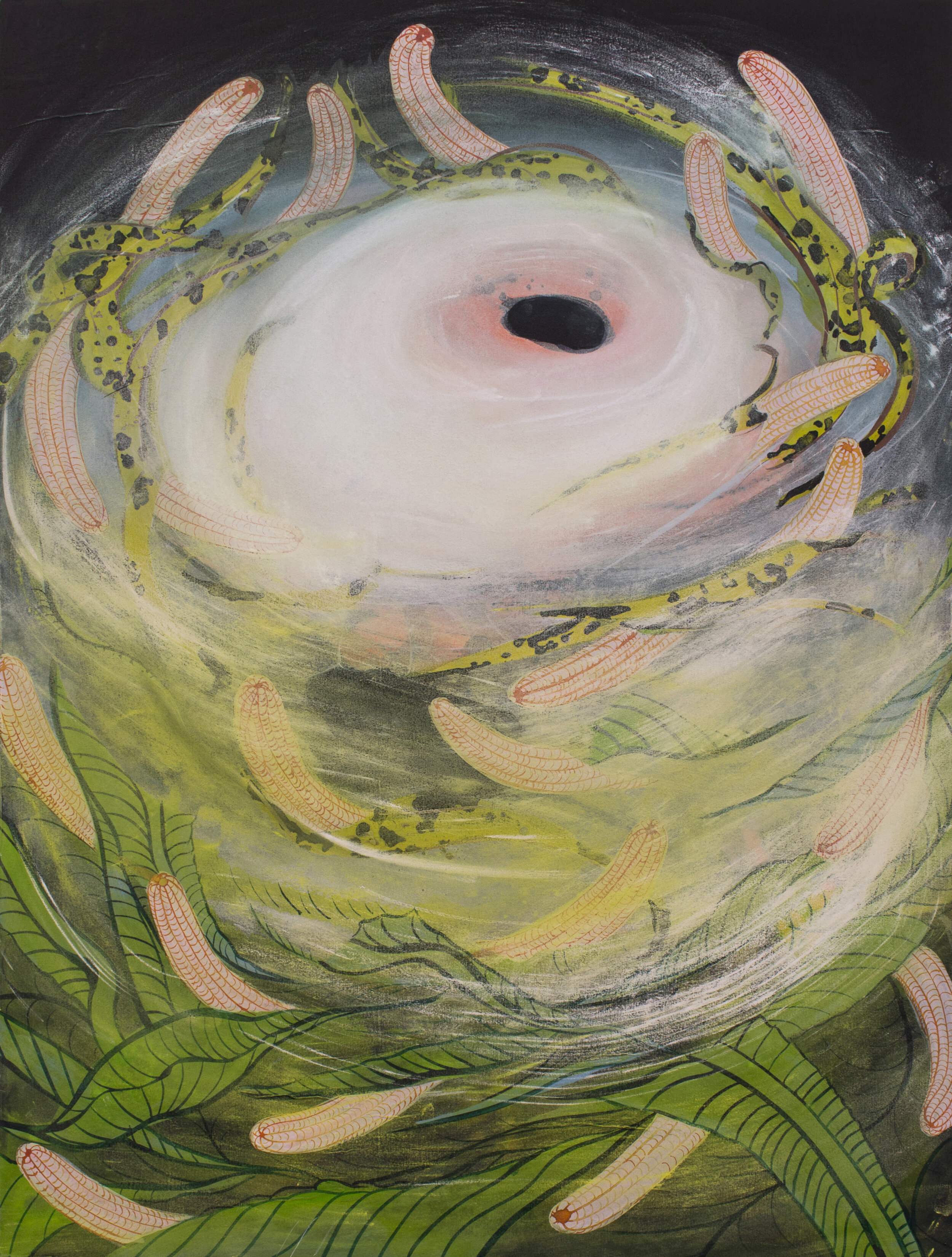
The following text are notes on this series of paintings…
I want my paintings to be unbelievably flat and matte. But, through color and line, and in particular the juxtaposition of extreme opacity and translucency, space is implied.
Matte is the type of heat and humidity of the tropics. It is so torrid and the air is so thick that everything is matte.
This list shows the progression of creating the paintings in loose chronology.
When Odysseus arrived in the land of the Cyclops he saw a land of abundance. The cyclops seemed peaceful, and there was an abundance of sheep.
Portrait of a Young Woman Looking Through, 2018
Đức Mẹ Chuối, 2018
The Cyclops are the “other” to Odysseus.
When viewers come to my world, they too see a land which is lush— only here, there are no sheep, instead there are banana trees.
My land my is tropical, and the cyclops are the “other” to us as my people have been an “other” to another.
This is a tropical-cyclops woman, who wears a one-eyed monocle. It slightly resembles aviator glasses popularly worn by American soldiers in Southeast Asia: US occupation of the Philippines and the Vietnam War.
Are these tropical-cyclops women monsters?
This particular woman also appears as Madonna, only her halo is the leaf of a banana tree.
When Odysseus met Polyphemus (the Cyclops), he introduced him to wine.
Polyphemus got drunk, and Odysseus told him that his name was nobody.
Much like the Polyphemus’ sheep which produced an abundance of cheese and milk, the bananas here are alive, producing sustenance for the tropical cyclops-women.
Here, an auntie almost kisses the banana blossom (or its kissing her)— and there is also a hand of an-“other” gripping on the banana. This other is something from outside of the tropical land.
Maybe she is harvesting the bananas, or the fruit is climbing down to her. Both.
Polyphemus keeps a lot of cheese in his cave, and Odysseus wants it.
One night Odysseus and his men go onto Polyphemus’ cave while he’s sleeping. But to their bad luck, Polyphemus awakens, he is angry, and he picks up one of Odysseus’ men and bites him in half, eats him.
To seek revenge, Odysseus then stabs Polyphemus in the eye.
Left blinded, Polyphemus cried for help, but when the other cyclops asked him what was wrong, he said, “Nobody has hurt me.”
The other cyclopes were confused and did not help Odysseus.
With that in mind, this is an image of a helicopter crash.
And with that in mind, this is also an image of a banana being smushed into one of my tropical cyclops-woman’s eye.
“Nobody has killed me” is written in blood.
“Nobody” in Greek is “Ou tis,” or literally “No one.”
Because of the way Greek grammar works when the other Cyclops ask Polyphemus who hurt him, he responded by saying “Me tis hurt me.” This is because the negative word “Ou” changes to “Mé” because the tense of the verb changes.
In other words “Nobody” = “Ou tis”; and “Nobody hurt me” is “Mé tis hurt me”.
Here is second slight (the first slight was telling Polyphemus that Odysseus’ name was “Nobody”): “Mé tis” sounds an awful lot like “metis” which means “trick” in Greek. Odysseus’ epithet is “polumetis” which means “tricky” or “turning in many ways.” So, when Odysseus laughs at the wounded Cyclops, he is also laughing because Polyphemus is saying that he is hurt by a trick.
Considering this, let’s also consider double-consciousness, the state of having your identity split into multiple parts, often understandings of the world that are contradictory.
The tropical cyclops women of my world have been canceled out into nobodies.
The growth and harvest of their bananas are forcefully taken away, forcefully fed to them, and yet it is their source of sustenance.
During colonialism, many tropical assets such as fruit (Banana wars: US, UK, and the Caribbean; and China & the Philippines) were taken, profited from, and then redistributed to the local community. As this happened, languages, were erased and replaced with others, many which used Roman characters. Religions were erased and some were replaced with versions of Christianity, namely Catholicism.
Now, to decolonize is an overly complicated and a difficult task as tropical peoples have also become dependent peoples.
Colonialism penetrated so many layers of tropical life that one might as well point and say, “Nobody did this to me.”
Colonialism could be thought of as “metis”. As in the Odyssey, the joke was certainly on the Cyclops aka the tropical peoples.
On Sept. 4th, this past late summer, the news reported that Typhoon Jebi was hitting Japan. It left a trail of death and destruction.
On the weather reports, the cyclone looked like a beating organ alive with blood, only this blood was of white cloud, compress, and swirling towards its release.
Helicopter Warfare, 2018
Typhoon Haiyan, more commonly known as “Yolanda” was the strongest recorded tropical cyclone in Southeast Asia. In 2013, it reaped havoc in Micronesia and Palau, the Philippines, Southern China, and Vietnam.
Kiss of the Blossom, 2018
Yolanda is the name of one of these tropical cyclops women, and after an era of someone else taking her bananas and also eating those same bananas day after day, she screams a long, long wail. Her scream is so loud it uproots the bananas that she has grown from her own womb, destroying herself, her people, and everything else around her.
In Sandro Botticelli’s painting the Birth of Venus, Venus’ face is the epitome of peace, much like the Virgin Mary.
Venus was born, though, from violence. In the beginning of everything there were only two gods: Uranus the sky god and Gaia the earth god. There was not separation between sky and earth and Uranus and Gaia were in a constant state of having sex. They had many children, but Uranus was scared of being overthrown so he kept all of the children stored inside of Gaia’s womb. One day, their son Saturn decide that he had enough with being inside his mother’s womb, so he castrated his father from inside allowing himself and his siblings to be born into he world. Uranus’ semen fell into the sea and from there Venus was born.
Early Christians had a big “Mary problem”. They presented her virginity as a high virtue, which went against pagan sensuality. But, then she became extraordinarily popular, even more popular than Jesus— so much so that there were independent cults of Mary which were a threat to early Church Fathers. Many of these cults reeked of paganism that the Fathers had to clamp down on “Mary-ology” for the sake of the Universal Church which was centered on Jesus.
This painting is called Đức Mẹ Chuối which literally is Vietnamese for Mother God of Bananas. “Đức Mẹ” is used in Vietnamese Catholicism and is how the Virgin Mary is referred.
The Roman Catholics entered Vietnam in the 16th century and it is now the second largest religion in Vietnam. It was not uncommon for me to hear Vietnamese Catholics in Vietnam thank the French for bringing them God.
Take this painting as a proposal to re-paganize [decolonize] “Đức Mẹ”.
Her body is tired, yet comfortable.
She gives birth to the banana tress which lead to her own cyclical demise.
Going back to “Nobody”… To the upper right of the painting, we see the Cyclops’ monocle fly away into her stormy hair. Here, though, the monocle reflects the word “Anybody.” If you split the Greek word for nobody, you’ve got “ou” and “tis”. “Ou” is no, but “tis” is “someone” or “anyone”.
So here, we have Venus, birthed and birthing from the the “split of the trick” of being called “Nobody.”
While chuối means banana in Vietnamese, it is also use in another slang term “cui chuối” which loosely means moronic.
In the Riau Islands of Indonesia there is a place called Pulau Galang, which was a large Vietnamese refugee camp after the end of the war.
I visited there and among many things I saw, I saw an enormous area for Vietnamese Catholics to worship and convene.
There were many statues of the stations of the cross, and this in this painting, the tropical cyclops-woman looks out and sees Jesus after he has died on the cross.
I was impressed at how well built everything was at this refugee camp, most structures are still standing, and even looked better than some of the villages around the Riau Islands. I asked a businessman in Jakarta if he knew why everything was so nice. He said, after the Vietnam War, the Indonesian government was overwhelmed with the flow of Vietnamese refugees. The United States that oil interests in Indonesia so they funneled money into the UN to help facilitate the building Pulau Galang.
Perhaps this tropical cyclops is a refugee— a banana refugee.
When she looks out, she sees the only story that she now knows, which is that Jesus sacrificed his life for our own salvation.
When she looks beyond, she see the blue water, make her eye, the one blue eye.
The water is her passageway, but more uniquely, this particular water is the Singapore Straight, which is the juncture where the Straight of Malacca turns into the South China Sea. (see notes on Daily Life in Malacca.)
In the late 70’s - 90’s, as refugees sought refuge in these waters, men on freight ships would help refugee boats by spraying them with water— such ships were at the mercy of the global economy, carrying goods such as bananas onto more profitable shores.
Scenery in Pulau Galang, 2018
There are three transformations of Christ: the Son, the Father, and the Holy Spirit.
Here, her blue eye is the Holy Spirit.
A view from afar of a new tropical place as if we are Odysseus, an explorer, and conquerer.
This is the first sight of new land which has been untouched.
This is the last sight of the used land which was touched all over and left behind.
Throughout the wars in the Pacific Rim, people still bathed in the waters: rivers, straits, and canals that connect the whole of Asia to the globe.
A lot of other things happen in the waters of the tropics, such as trade.
The Strait of Malacca is the busiest straight in the world. It is the singular conduit for trade from the Indian Ocean into the South China Sea.
The Strait of Malacca allows from oil from the Middle East to travel to East Asia.
A helicopter flies over these women as they bathe. Their offspring— the banana blossom— curls around them, embracing them, maybe.
Yes, that’s the tropical cyclops women bathing themselves with banana goo. It is shampoo and cum all at the same time.
The “Pacific Proving Grounds” was the name given by the United States to a series of nuclear tests conducted inside the Pacific Rim between 1946-1962. Their names are: Crossroads, Sandstone, Greenhouse, Ivy, Castle, Redwing, Hardtack, and Dominic.
These operations are not nobody.
These are names of some of these tropical cyclops women.
The nuclear tests live inside the bodies of those who were effected in the tropics for generations.




